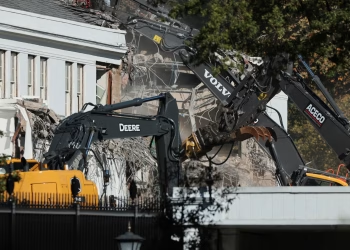Peter Endig | AFP | Getty Images
New Jersey Attorney General Sued Amazon Wednesday, alleging the company violated the rights of thousands of pregnant and disabled employees who work at several of its facilities in the state.
The complaint, filed in Essex County Superior Court by Attorney General Matthew Platkin’s office, alleges that Amazon violated the state’s anti-discrimination law in the way it treats pregnant employees and employees with disabilities when they request work accommodations.
The state said the lawsuit followed a years-long investigation by its civil rights division into Amazon’s treatment of New Jersey warehouse workers.
According to the complaint, the state’s investigation found that since October 2015, Amazon allegedly violated the rights of pregnant and disabled employees by placing them on unpaid leave when they requested accommodations, denying them reasonable accommodations, and “unreasonably” delaying its responses to workers’ requests.
He also claimed that Amazon was “unlawfully” retaliating against these workers when they sought accommodation, including by firing them. After workers were granted an accommodation, Amazon reportedly fired some employees for “failing to meet the company’s strict productivity requirements.”
“There is no excuse for Amazon’s shameful treatment of pregnant workers and workers with disabilities,” Platkin said in a statement. “Amazon’s egregious behavior has caused enormous harm to pregnant workers and workers with disabilities in our state, and it must stop now.”
Amazon spokeswoman Kelly Nantel said in a statement that accusations that the company fails to comply with federal and state laws, such as New Jersey’s anti-discrimination law, are “simply false.”
“Ensuring the health and well-being of our employees is our top priority, and we are committed to providing a safe and supportive environment for all,” Nantel said.
The company said it approved more than 99% of pregnancy accommodation requests submitted by workers. Amazon also denied automatically furloughing pregnant workers and claimed it unjustifiably denied accommodation requests.
The complaint seeks to demand that Amazon pay compensatory damages and unspecified civil penalties, as well as court orders requiring the company to adjust its policies and submit to monitoring and reporting requirements for five years, among other remedies.
One incident described in the complaint states that an unnamed pregnant employee received an accommodation that allowed her to take additional breaks and prevented her from lifting objects weighing more than 15 pounds.
Less than a month after the accommodation was approved, she was allegedly fired for “failing to comply with packing numbers,” the lawsuit says, even though her accommodation required her to pack fewer items each shift.
In another case, a pregnant employee’s accommodation request was closed due to a lack of medical documents when the requested documents were not required. As the worker attempted to resubmit her application, she allegedly received three warnings for “poor productivity” and was ultimately fired for “failing to meet her salary,” according to the complaint.
Amazon’s internal investigation into her case did not confirm that the employee was fired because of her pregnancy, but the company ultimately reinstated her with back pay, according to the lawsuit.

Amazon said in a statement that it does not have fixed quotas at its facilities, adding that it evaluates performance “based on safe and achievable expectations and takes into account time and seniority, peer performance, and adherence to safe work practices.”
“Amazon’s discriminatory practices and systemic failure to accommodate pregnant workers and workers with disabilities have the effect of excluding these employees from Amazon’s workforce – the very outcome that the (anti-discrimination law) was intended to prevent,” according to the lawsuit.
Amazon’s treatment of pregnant employees and other members of its sprawling front-line staff has come under scrutiny in the past.
The company, which is the nation’s second-largest private employer, faced lawsuits from workers at its warehouses, who alleged the company failed to accommodate them once they were pregnant and then fired them for failing to meet performance standards, CNET reported.
The Equal Employment Opportunity Commission last year opened an investigation into Amazon’s treatment of pregnant workers in its warehouses after six senators urged it to do so, citing a “concerning pattern of mistreatment.”
In 2022, the New York Division of Human Rights filed a complaint against Amazon, alleging that it discriminated against pregnant workers and workers with disabilities in its facilities.
Amazon said it does not comment on pending litigation.









